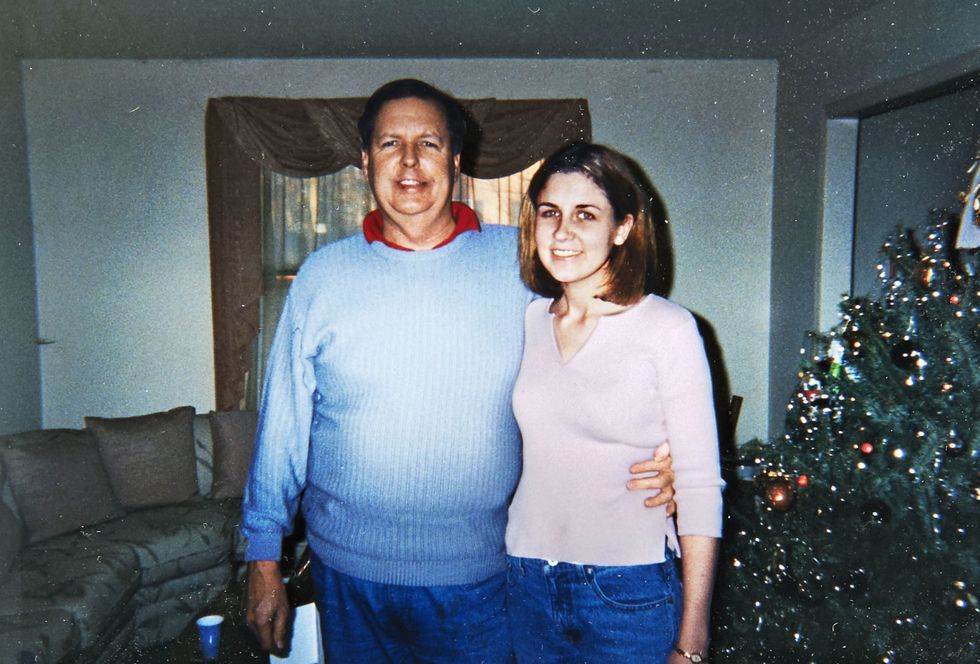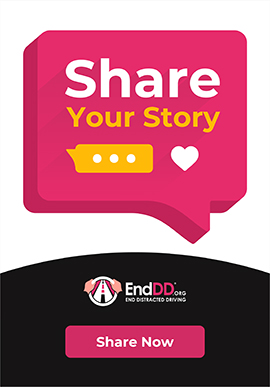Kudos to Laura Carney who gave up her smartphone for 22 days and will be doing so annually in honor of her late father and Casey Feldman, both of whom were killed by distracted drivers. While Laura had already given up gave up her smartphone use while driving, she decided to see how giving it up completely would affect her life overall. Laura found that she was more present and creative, had better conversations, more hours in the day and was happier. Read about Laura’s three week journey, the aftermath and tips if you want to modify your smartphone use.

By Laura Carney* 09/26/19
I had no idea how much of an Internet world I’d been living in, comparing my own Internet life with other Internet lives. Compulsively engaging with our smartphones distorts our self-image and objectivity.
The idea to give up my phone came to me one day when I saw Facebook posts about the 10th anniversary of the death of 21-year-old Casey Feldman, who was killed by a distracted driver. I wanted to do something special to commemorate this, and then realized her anniversary was 22 days before my dad’s. He was also killed by a driver using a phone.
I announced it on Instagram, knowing I wouldn’t open the app for three weeks to see anyone’s reaction to it:
“Because I believe distracted driving starts even before we get into a car, I’ve decided to go on a smartphone cleanse for 22 days every year, starting this year. That means the only phone use I will have is what it was built for—phone calls (and of course, not while driving—hands-free is risk-full!). I hope some of you will join me in this phone-free detox. I’m giving up apps, Instagram, music, podcasts, texting, whatever my phone does that puts it between my eyes and the world, for 22 days every year to honor two very special people who died because of it. I imagine my life will be much friendlier and more productive as a result. We’ll see. I’ll report back here on August 8. Good luck to those of you who join me.”
Nothing could have prepared me for what came next.
Week One
It’s only been six days since I decided to go phone-free (except for calls) for a month, and I’m already happier. On Sunday night, I saw this beautiful sunset and was disappointed in myself when my first instinct was “must post photo of gorgeous sunset”…and of course I couldn’t, because I couldn’t use my phone, not even to take photos. Then I got really happy because I realized I was actually LIVING the sunset, something the compulsion to document everything can interfere with. Also, no more comparing my life to other people’s lives on Instagram or Facebook, and that’s bound to raise someone’s happiness level.
I’ve cheated a few times when I had no other option, like when my train was coming and I didn’t have time to buy a ticket. But other than these times, I’ve fought every urge to look at it. If someone texts me who doesn’t know about my cleanse, I politely text back but keep it short. No more novel-long texting sessions, which I’m realizing are nowhere near as effective or connective as a simple phone call.
I’m also more present and creative. Ideas for my writing have come to me more clearly—I feel less lost in structuring stories because my brain is more present and I’ve got plenty of time to think about it. I’m more present in pretty much everything I do. There is a clear line now between being on a computer and being out in the world, just like there used to be, before smartphones.
My conversations are better. Because I’m more present when I’m by myself (i.e., not reading my phone), I’m also more present when I’m with others. I’m a better listener and my stories are better (or so I’m told). I’m operating at peak capacity instead of whatever percentage I was at before. And I’m hella more productive! When I’m sitting at a desk, my brain gets it that this is “work time.” There is a balance, a dividing line between work and rest.
In short: Life is so much better. Yes, I’m getting pretty bad FOMO. I guess I just have to trust that whatever I’m missing probably isn’t all that important. And there are still analog ways to do things, we can still exist in the world without being connected 24-7. When I see other people on their phones for entire train rides or walking around (or tonight, when I saw a guy straight-up watching a movie on his phone with giant headphones while RIDING A BIKE), I feel bad for them. I think, Man, I’m sorry life is so uninteresting to you that you have to do this.
None of this even begins to address people who have to stay on their phones while driving, the catalyst for my doing this. But I’m beginning to see why the addiction is so hard for them to break. If they weren’t addicted, putting a phone aside would feel like nothing.
Week Two
I’ve had moments during the past week where I felt tempted to use my phone. I did have a few exceptions this week, like brief texts with a friend I was meeting for dinner who didn’t know about the cleanse and emailing a work contact when an assignment was suddenly due. And I’ve used my phone for my alarm clock.
But other than that, I haven’t used it at all.
This means no Googling when I want to know about something. I have to actually think things through and surmise an answer. Not feeling like this gadget requires my constant attention is tremendously freeing. I hadn’t realized how much mental energy I’d been needlessly devoting to it all this time.
Another interesting development: My animosity towards just about anyone has softened. If someone says something I perceive as troubling, I give them the benefit of the doubt. I’m noticing that with the lack of phone interaction (texts, social media, etc.), I’m thinking in a more civilized manner. I greatly prefer this way of relating—one that allows for shades of gray in people’s motivations.
On the flipside, I’ve had a few moments of anxiety that surprised me. I found myself crying profusely twice and feeling great panic and overwhelm a few others. I realized that in my regular life, these emotions are being suppressed. The panic is coming from just plain existing without being able to distract myself with my electronic pacifier. And that’s scary—what other emotions has my smartphone been repressing all this time?
Cognitively things are better, too. Creative problems are solved faster. I have more faculties available to me and can think more deeply about them. My vocabulary is better and I have better access to my subconscious, so a writing problem I was struggling with for a year has now been solved.
I also suddenly have more hours in a day. Not stopping to photograph everything and then sharing it means I get to experience the thing fully, just by myself or with whoever is next to me, and I get to experience twice as many of those things.
Don’t get me wrong, I’m not saying that sharing things via your phone is a waste of time. Like everything, it’s meant to be a tool to enhance your life, not escape it.
I had no idea how much of an Internet world I’d been living in, comparing my own Internet life with other Internet lives. It seriously distorts your self-image and objectivity—and sense of gratitude. I am so grateful now for my wonderful life, one I am living, through my own eyes, and not through a screen any longer.
I can’t wait to see what the next 11 days bring.
Week Three
Of course I would manage to schedule driving somewhere new smack in the middle of my 22-day smartphone cleanse. I was invited to speak on a podcast today an hour and a half away.
When I set out to make the drive, I figured I wouldn’t need GPS at all. It was a straight shoot down the Garden State Parkway, with only two turns at the end. But then I needed to stop for gas.
I’d been rehearsing in my head things I might say during the podcast—like how bad technology is for us. And then technology saved me. I turned too soon, into a car wash instead of the Lukoil, and I couldn’t see any way for me to get over there. I pulled over into a gravelly parking lot, put the car in Park, and opened my GPS. It rerouted me and got me where I needed to be.
Using GPS is okay. It’s interacting with GPS while driving that’s not. I emailed my podcast hosts to tell them what happened while I was sitting in my parked car at the gas station, which was safe. Doing that while driving would not have been.
Week Four: The Aftermath
I’ve been allowing myself all smartphone privileges again for six days now, and it’s been really weird.
Thursday, the anniversary of my dad’s death, was the last day of my 22-day smartphone cleanse. I experienced it far differently than I have in years past—mostly because I didn’t wake up thinking, What should I write about this on social media? Instead, I talked with my family about it, on the actual phone. There is something about sharing these things online that isn’t sufficient—it almost dissipates the weight of this very private thing. Plus, the responses you get from strangers can never equal the heartfelt responses you get from people who were actually there.
On Saturday, just before my cleanse ended, I was walking around my neighborhood and noticed another development—I was looking around more. I was seeing more of my world because the tunnel vision I’d developed from looking at a small screen all the time had gone away. Even six days back from the cleanse, I haven’t returned to it.
My first time looking at my phone for longer than five minutes was last night. I could feel the addiction start to take hold again, so I imagined a giant X over the phone when I went to bed. After I set my alarm, I flipped it over so I couldn’t see the screen. When I woke up and checked the time, I saw someone had texted me but decided I wouldn’t respond until I’d gotten to work—in fact I wouldn’t use my phone at all until I got to work, just like I did during the cleanse. I’m going to keep doing this.
One Month Post-Cleanse
It’s now been four weeks since the end of my experiment, and I’m still not back to using my phone like I was. I don’t use it until I get to work, and I don’t use it after I get into bed at night. I also haven’t gone back to listening to music on my phone. Early on, I realized I wouldn’t be able to make it through the cleanse without music, so I switched to using my iPod. Turns out the audio quality is much better. Plus just listening to music is more enjoyable when you’re not also checking email and reading texts.
The hardest part is when I can’t sleep. In the past, I’d scroll with my brightness dimmed, hiding the phone below the mattress so as not to wake my husband (an incredibly light sleeper). But now I picture that giant red X over the flipped-over phone along with a big circle around it, “no smoking”-style. And that seems to help.
Engaging with our smartphones is a never-ending cycle that starts with good intentions. We check it to be sure family members are okay. Next thing we know, we’re checking for texts from our mothers, then work email, then texts and email from friends, then all our various social media accounts. We have our calendars and exercise and music on our phones. And then we’ve got the devastating 24-hours news cycle and you-know-who’s Twitter account. The result is we’re chronically feeling bad about ourselves.
We feel like we’re never enough.
And then before we know it, we’re compulsively checking while driving—when the most compassionate thing we could do for ourselves, our kids in the backseat, and other people out there on the road is be present.
When we make the effort to actually see others, with our own eyes, we open the door to be seen ourselves.
We open the door to see ourselves.
Five quick-and-dirty tips if you want to modify your phone use:
1. Give it up cold-turkey for a set amount of time. Knowing I had a 22-day deadline helped me stick to it. It’s a misconception that it takes 21 days to start a new habit. Scientists have found it typically takes more like two months or longer. But if you give yourself three weeks, that feels more doable. Even a few days, as you can see from my accounts, can make a big difference.
2. Do it for someone you love. I did mine for my dad and for a girl I’d never even met who died the same way my dad did. It never would have been enough for me to do it just for my own well-being or the well-being of others. When we do things for honor, it makes our drive stronger. It’s how marathoners finish races when they’ve raised funds for charity at the same time.
3. Don’t beat yourself up if you slip. Whatever you slip on will teach you a lot about yourself—though I already knew I ran around like a chicken with her head cut off. The idea is to limit the hold the phone has on you, not prohibit use when you legitimately need it.
4. Don’t worry about losing social media. People you’re truly close to will understand and bend to fit your new rules. And the people whose voices you miss hearing will become closer again. A novel-long text exchange does little to convey the emotions a five-minute phone call can.
5. Don’t be scared if emotions appear that you didn’t know were there. Our phones keep us in a perpetual state of reactivity. It’s better to be available to think and process things fully. We become like superheroes when we have our wits about us—able to be aware and help others, able to talk to strangers and make new friends, able to think an idea all the way through, able to appreciate the beauty of a songbird or a tree or a new house going up. As small as our worlds might feel without constant awareness of all those other worlds online, it’s easier to feel gratitude and that our life is a good life—and we are the ones leading it.
[Reprinted from the fix.]
______________________________
 *Laura Carney is a magazine copy editor and writer in New York. She’s been published by the Washington Post, The Hill, Runner’s World, Good Housekeeping and other places, and also works on literary journals and TV recaps. She’s currently writing her first book, about finishing 54 items on her late father’s bucket list in only four years (@myfatherslist on Instagram and Twitter; myfatherslist.com). Her website is bylauracarney.com.
*Laura Carney is a magazine copy editor and writer in New York. She’s been published by the Washington Post, The Hill, Runner’s World, Good Housekeeping and other places, and also works on literary journals and TV recaps. She’s currently writing her first book, about finishing 54 items on her late father’s bucket list in only four years (@myfatherslist on Instagram and Twitter; myfatherslist.com). Her website is bylauracarney.com.





